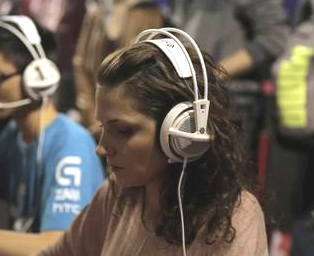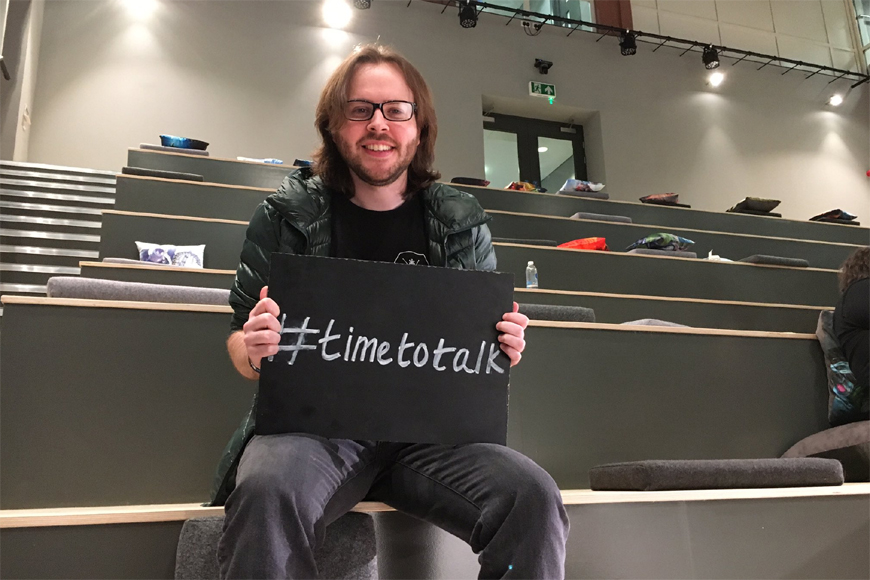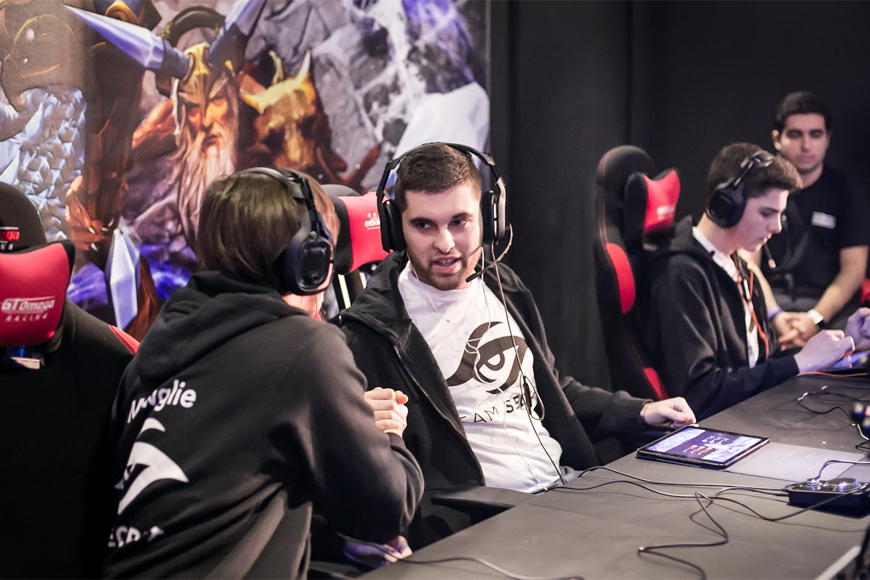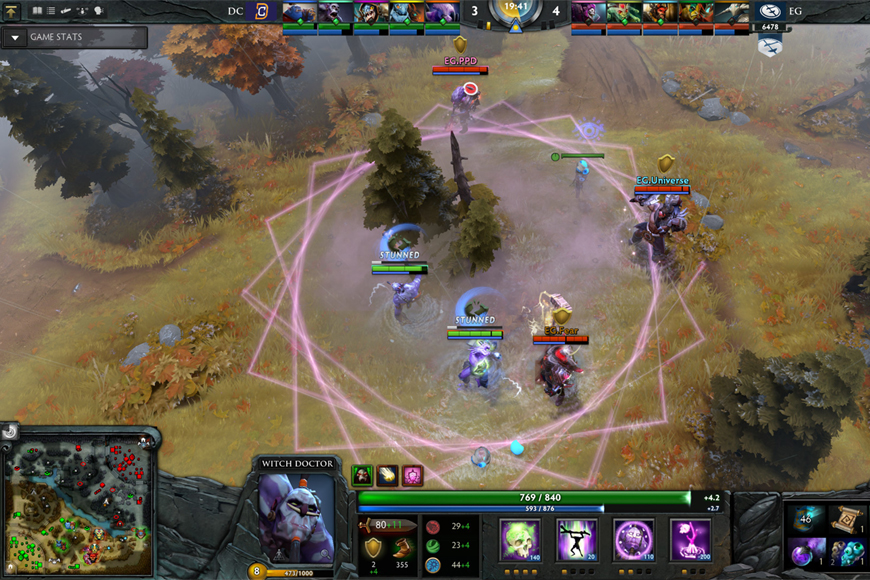Dominic Sacco asks 10 people in UK esports and beyond how mental health has affected them, and whether esports has been a positive outlet for them in some way.
Last week, Rich Eddy from RuneScape developer Jagex wrote a brilliant piece on GamesIndustry.biz about the importance of mental wellbeing in the workplace.
It reminded me: Earlier this year the BBC was thinking of producing a show on esports and how it’s helped some people get through depression. For whatever reason, they didn’t produce it in the end.
As it’s Mental Health Awareness Week (May 8th to 14th), I thought I’d put something together myself as I feel it’s an important topic. It also follows on and relates to this interview with Paul “ReDeYe” Chaloner about burnout in esports.
I think the work of organisations like MIND and the Mental Health Foundation and the Time To Talk/Time To Change campaigns are great, and on that note let’s get talking about mental health in esports.
I want to sincerely thank everyone who approached me after I asked for comments on this subject, and for opening up and sharing your experiences. It’s not easy to talk about things like this – let alone doing so on a public platform.
Also, thanks to RuneScape personality IanSpam for letting me use his #TimeToTalk picture as the main article image.
Just a reminder, my dms are open to everyone if you want to reach out and chat, don’t suffer alone.#TimetoTalk pic.twitter.com/6glDvdZCdq
— Ian (@ianspam) May 9, 2017
Some of the stories were upsetting to hear, some were difficult to read.
However, I really think the overall message here is positive. If just one person reads this article and finds strength or inspiration through the stories shared below, then that’s valuable and always worth covering and speaking about.
Mental health affects everyone in different ways. Because of that, I’m not going to write this as a long-form feature with cherry-picked quotes here and there.
Instead I’d like to publish each individual’s own stories, direct from them with no chopping or changing or major editing. So enough of me, here are the stories and experiences I was sent in below, listed in alphabetical order.
‘Esports has helped and harmed, but high level games help keep my mind off things’
Ashley “Rifty” Mayes, UK League of Legends top-laner for MnM Gaming

I think esports has both helped and harmed, I was attacked so viciously before, both in real life and online at a LAN, that I overdosed to try and end it, but at the same time a lot of the people I’ve met solely because of esports have helped me through so much, like Billy [“Nutri” Wragg].
I’m in the MnM gaming house right now and its really hard to control a lot of the issues I have especially with emotional regulation and hallucinatory episodes. But being surrounded with people in this industry who are all here to help and strive towards a common goal, it helps give me the strength to push past it and keep working or helping out.
Also the ability to focus solely on something that is pretty mentally taxing such as the competitive nature of high level games, this helps keep my mind off of things and keep myself in check.
Esports isn’t particurlarly my kind of thing nor something I’d say I was too interested or devoted to, but it’d be remiss of me if i didn’t admit how much a lot of the industry and the people have helped.”
‘Competing gave me something to focus on and work towards’
Dan “Aux” Harrison, League of Legends support player, exceL Esports

When I eventually joined a team, it helped having something in my schedule, something that’d get me out of bed and something that I had a commitment to. It made it easier for me to eventually start adding other stuff to my life – and as of last September I’m now on a college course and hoping to attend university in September.
My mental state was really bad, I’d get mood swings and feel suicidal at my lowest points. Gaming was a good distraction as it was really engaging and I’d have to put 100% of my focus into it, so it helped me to forget about my problems – even if for just 30 to 40 minutes at a time.
During a rough time in my life, competing gave me something to focus on and work towards. It was something I had motivation for and I feel like I would’ve struggled to get back into education if I hadn’t pursued gaming during the time between my A-levels and now.”
‘It got me to socialise and make a few great friends’
George “HudzGG” Hoskins, streamer and former CSS pro

I’m also battling depression and anxiety – I find it really hard going from the top of something to being forgotten.
It’s a tough battle. It’s been a battle dealing with being a top player in Source worldwide to out of the limelight in CSGO a bit. It’s something I talk to people about as esports isn’t always a guarantee. That was CGS-era when the recession hit and killed it all for a while.
Some things in gaming were positive however – it got me to socialise and I have made a few great friends who I keep in touch with.
There have been some positives but a lot of negatives. I think it’s important for people to realise, as all I see are kids throwing away everything to make it in video games – and the reality isn’t that great sometimes.
I just think it’s important these kids have back-up plans, as I never did and it’s left me a bit in the lurch.”
‘League of Legends and esports were my escape’
Jamie “Tundra” Duthie, UK League of Legends veteran, coach and streamer

Esports and games were the only things I was able to do at that point and leaving university mid-semester caused me to be in serious debt.
Being unable to work a regular job in the state I was in, all I could muster myself up to do was esports, I played tournaments to survive and make rent.
After my so far total of six years in Esports, three of which after my depression began, I’m finally out of debt and I’m coming out of a dark hole.
That first year out from university was my most successful earnings-wise and it was a critical reason I was able to afford rent and pay bills.
League of Legends and esports were my escape, a place where how I felt didn’t matter, a place in which I was talented and had respect, the causation for the way I felt wasn’t there anymore and it allowed me to be the person I wanted to be.
‘Esports has converted a bad situation into a community and career path’
Jay Massaad, content creator for the National University Esports League (NUEL)

It was during this low time in my life that I became aware of the NUEL. It was everything I needed at the time – a welcome form of escapism, providing me with a sense of purpose whilst I became increasingly disconnected with my studies; but more importantly, it gave me a community, where I could find plenty of like-minded people at my uni who would go on to be some of my best friends.
Alongside some of those friends, I went on to represent the University of York at the largest inter-university varsity in Europe against Lancaster. It was the first time a varsity had an esports events count towards the points total. To be a part of an historic esports competition made me immensely proud – a world apart from the embarrassing stigma attached to a solo gamer.
I ended up joining the team at the NUEL, where I’ve helped provide content to thousands in the community for close to two years. It’s been an excellent opportunity and valuable work experience. I even quoted NUEL chief Josh Williams (the patron saint of UK esports) in my final year dissertation. Esports has definitely been my way out, converting a bad situation into a community and career path.”
‘We are all one community’
Josh “CitrusEmpire” Leighton-Laing, Vainglory content creator, moderator and freelance graphic designer

Without going into the graphic details, it’s awful, it has always been awful, and it will always be awful. As a coping mechanism when I was younger I got into gaming – Frogger on ye-olde-atari was the game of choice. Going for a cheesy fade in/fade out flash forwards to years later, and I was enthralled with the PS1 – my games of choice were Spyro, Crash Bandicoot, and eventually my first taste of competitive gaming: Diablo II. Diablo II? Competitive? Yep. That’s right.
Blizzard had this amazing Ladder system, which lead to discovering a community that had been using gaming as the ultimate escape from all the negativity I’d been experiencing away from the keyboard for something more than just a sweet storyline and some (at the time) killer graphics.
Competition. Gaming stopped just being a game for me, and started to be about community. About passion. About burning as many waking hours outside of school as possible to learn the meta, the fastest way of clearing levels, dungeons, and forcing item drops. Despite the late nights and sneaking down to the computer until the small hours (lol sorry mum), I felt better when I was online – to the point where I preferred the company of ad-hoc parties to my real life peers.
Personally, it was a trade I’d be happy to make a thousand times again. After all, why kick a football when you can place top of the ladder in EU West as a hammerdin at age 14? It was gratifying. While my experiences away from the online community had damaged my esteem, smashing away at online games, downing bosses and trying for high placements was doing wonders.
My confidence, my mood, just about everything lifted – and since then it’s been a continuing trend. It frustrates the people around me to no end that I’m willing to throw so many hours into a game (I clocked 100+ hours on a few titles within the first week of picking them up), but ultimately it means that I’m a better person around them. By focusing on strategies, meta and tournaments I can step away from the things that haunt me on a daily basis and be, well, me.
And I’m certain I’m not alone there. While the stress of competition isn’t all that great, it’s a challenge that allows me to improve myself as a person. And that’s a good thing.
We get to live, and relate to stories and characters, or struggles with teams on a daily basis instead of having a self imposed weight drag us into the dark depths of our own psyches. It allows us to connect to people just like us.
Dealing with your issues is difficult, but with esports and gaming, we’re all in the same boat, we’re all pushing for the same thing. It’s a level playing field, and while we might get salty and tilted about those clutch ranked losses that stop us from going up a tier, we’re all one community that has always – and will always – form the most ridiculous support network anyone could ever ask for, and I’m beyond glad to be a part of it.
I’ll stop there, but I could go on – as I said, full thesis, but I won’t. I will however say that my DMs are always open – if you’re struggling, reach out to me. If you’ve experienced the same things, come say hi. Even if you’re not dealing with stuff or if you are and don’t want to talk about it, come hit me up for some games, and remember that you have this common interest with *millions* of people around the globe, and that’s pretty damn awesome.”
‘Esports helped me to cope with my disability’
Petya Zheleva, SKYLLA founder and former CSGO player

Esports helped me to cope with my disability and my disability helped me in esports. The loss of sense of smell enhanced my sight and reflexes which are so important for FPS games.
Losing the ability to naturally alarm my brain for dangerous smells provoked changes which are balancing the flow of information that is being processed by my brain.
I do however still have problems with focusing but esports, and in particular competitive games, are helping me for this as well.
Esports are accessible to everyone, and I really believe that the industry has to encourage more people with similar conditions to mine to find the best way to express themselves through what they love regardless of any differences.”
‘The training and support I had made competing such a positive experience’
Robert “Ephi” Aguirre, Brawlhalla player, Reason Gaming

With the support of my teammates, fellow players, and my sponsor, I attended the Brawlhalla World Championships in November. It was, to me, completely unthinkable that I could fly to another continent and compete considering my health.
But the training, support and atmosphere made it such a positive experience for my health. Now a few months later I am getting healthier each week and will be looking at returning to university in the coming years, as well as looking to push for some first place finishes.”
‘Esports has given me a lot of friends and almost a family to fall back on’
Victoria Rose, freelance writer for PC Gamer, ESPN Esports and Esports Insider
“Attention and social disorders tend to fold into difficulties at school, which often folds into depression. I got the unlucky cocktail of all of these things stacking up in my freshman year of college.
I found a variety of things to distract me, but ultimately, a Dota 2 beta invite sealed my fate before the end of the fall 2012 semester. By the time summer rolled in, I’d played for seven hours average per day. And worse, I’d been skipping classes to play in the day, and at night I’d play or go elsewhere to do any number of things I shouldn’t be.
At that point, there was no real gaming community that knew me at that school and could recognize the issue, so I was on my own.
I had to take a year off to pull myself together. I’d already racked in hundreds of hours. But soon I realised I didn’t want all of that to go to waste – Dota 2 was and is a legitimately great game, and I was playing with my boyfriend, who I introduced through TI3.
I returned after that year and eventually realised that I really wanted to take an active part in the scene, so I channeled more time into different roles. Shoutcasting didn’t shake out, so I tried writing about Dota 2 and esports.
Writing eventually became the best distraction of my life. I’d acquired a laptop for college, so I was still in the classes and participating and taking notes while doing the esports writing at the same time. Skills from school and esports writing overlapped often.
And esports has given me a lot of friends and almost a family to fall back on. Hell, I’ve talked to others about issues, and the Dota 2 community has the mental health chat a lot. If you ask around, a lot of people are willing to talk about mental health.
Really, even if I weren’t trying to be professional, esports is more than a hobby. It’s not an industry, or a field, but a community. And even professionals often miss that. You can’t put a price on the way people support each other in esports.
I haven’t necessarily “gotten rid of” the issues that got me into a bad spot, because social and anxiety and communicative and depressive issues are mental health issues. You can’t just wave away brain stuff. But esports has given me a way to live with it more healthily.”
‘Watching and playing esports was my main outlet’
Will Noble, Overwatch/League of Legends player
“I was struggling with a ton of stress from GCSE exams which had made me quite really emotional and aggressive a lot of the time. Watching and playing esports was my main outlet for getting away from the stress.
On a different note as well, when I was younger I was diagnosed with Aspergers and was never really that great at being social. Esports helped me learn how to be social with the friends I made through my time playing esports.”
More information
Thanks once again to everyone who contributed to this article.
If you are looking for more info, advice or support regarding mental health, here are some useful links below:
- MIND
- Mental Health Foundation
- What to do if you or someone you know has a mental health problem – British Esports Association
- NHS
- Samaritans

Dom is an award-winning writer and finalist of the Esports Journalist of the Year 2023 award. He has almost two decades of experience in journalism, and left Esports News UK in June 2025.
As a long-time gamer having first picked up the NES controller in the late ’80s, he has written for a range of publications including GamesTM, Nintendo Official Magazine, industry publication MCV and others. He also previously worked as head of content for the British Esports Federation.




